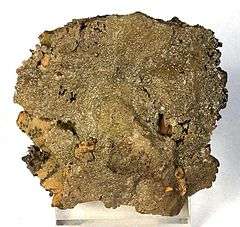Chlorargyrite
| Chlorargyrite | |
|---|---|
|
Bromian chlorargyrite (embolite), Chañarcillo, Copiapó Province, Chile. Size: 5.0 x 4.7 x 1.0 cm. | |
| General | |
| Category | Halide |
| Formula (repeating unit) | AgCl |
| Strunz classification | 3.AA.15 |
| Crystal system | Isometric |
| Crystal class |
Hexoctahedral (m3m) H-M symbol (4/m 3 2/m) |
| Space group | Fm3m |
Chlorargyrite is the mineral form of silver chloride (AgCl).[1] Chlorargyrite occurs as a secondary mineral phase in the oxidation of silver mineral deposits. It crystallizes in the isometric - hexoctahedral crystal class. Typically massive to columnar in occurrence it also has been found as colorless to variably yellow cubic crystals. The color changes to brown or purple on exposure to light. It is quite soft with a Mohs hardness of 1 to 2 and dense with a specific gravity of 5.55. It is also known as cerargyrite and, when weathered by desert air, as horn silver. Bromian chlorargyrite (or embolite) is also common. Chlorargyrite is water-insoluble.
It was first described in 1877 for occurrences in the Broken Hill district, New South Wales, Australia. The name is from the Greek, chloros for "pale green" and Latin for silver, argentum.
See also
| Wikimedia Commons has media related to Chlorargyrite. |
References
- ↑
 Chisholm, Hugh, ed. (1911). "Cerargyrite". Encyclopædia Britannica (11th ed.). Cambridge University Press.
Chisholm, Hugh, ed. (1911). "Cerargyrite". Encyclopædia Britannica (11th ed.). Cambridge University Press.
- Palache, C., H. Berman, and C. Frondel (1951) Dana’s system of mineralogy, (7th edition), v. II, pp. 11–15
- Webmineral data
- Mindat with location data
- Mineral Data Publishing PDF
